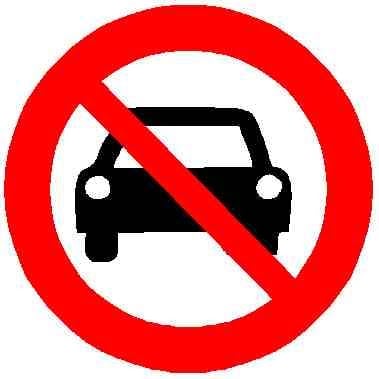Cars fulfill a very self-indulgent narrative. ‘I get to decide where and when I travel’, makes people feel “free” snd “important” even when millions of them are silently coming to the same decisions-- like going downtown at 09:00 on weekdsys-- that allow huge efficiency plays.
Notice how many ads feature fantasies of open roads and trips to faraway attractions, not the real world of “I need to sit in rush hour traffic from 6:30 on to get to the Work Factory”
Maybe public transit needs to focus its message on the freedom from drudgery it offers-- you don’t have to be staring at the driver in front of you, scanning the traffic reports
Exactly! This is why I love micromobility and quality public transit so much. With micromobility like electric scooters or bikes, I can zip past traffic in the protected cycle lanes in my city. With the frequent metro service in my city, I know I can show up to the metro station at basically any time and know it’ll be a max 5-minute wait for the next train. And when I’m on the train, I can just chill and scroll on my phone or read a book instead of stressing about traffic. The freedom to think about something that isn’t traffic.
I’d say it is more about
convinceconvenience. You decide when you leave and you leave from your door. You don’t risk being late to work because you missed the train by 1 minute (baring queues, but you get the point).This can also be achieved by high frequency transit.
Yeah, if the train comes every five minutes, that’s going to be way more consistent than traffic over time.
Really depends where you live. In my town I also decide when I leave, and I don’t risk being late because I missed the train by one minute. I’ll just take the next one. More risk of being late because of car traffic.
The problem when people compare cars to public transport is that they compare the current state of public transport in their area. We need to compare what would happen if we were spending as much billions as we do on cars.
If I’m doing a short trip locally in the city, I get that convenience out of my bike. There are times I would have taken a taxi somewhere, but when the app told me how long it would take for my driver to arrive, I just end up cycling there (often rolling past some long lanes of traffic in the process). That process can be even better if a city is built with safe biking paths.
Unfortunately that’s super weather dependent and seasonal. Plus, some of us would be a sweaty mess by the time we biked to where we needed to go.
Bikes don’t have to be seasonal. Some Nordic countries have well maintained and plowed biking networks and they see significant use throughout the winter.
I dunno what country you are from, but here in the US of A, the monopolies that own all the train infrastructure make sure to keep trains as public transportation as cost prohibitive as possible.
Because trains aren’t economically viable for the vast majority of the US, and where they are economically they are the topic of conversation.
As far as why the conversation would center around the US, that’s just the regular American-centric tilt english conversations generally lean towards. Most of Europe has their shit together in some topics like this (public transportation, for instance) and the US is a huge consumer of automobiles and no one if building mass transit between the middle of nowhere to the other middle of nowhere where we could ‘efficiently’ move individually insignificant numbers of people at a time.
Vast majority of the US in terms of people or dirt? Cause they’re viable for a vast majority of people.
Mostly dirt, but that dirt is also something that has to be travelled over to get between the people…and the scale of the US means there’s a lot more of it to span.
Inside a city electric trains make more sense, but unlike the EU there are very few places in the US between population centers that could economically support the infrastructure needed for high speed rail.
For example, Texas is roughly the size of France, but with only a third of the population, and hundreds of miles between population centers, none of which could expect to see the amount of travel needed to justify that much rail line.
Basically, take Europe and their economically viable rail line, get rid of 3/4 of the population and 3/4 of the cities so each stop is 3 to 4 times further away from each other and ask the people running the trains if they would still be profitable considering they’re still having to cover the same distances with a 1/4 of the income.
Mostly dirt, but that dirt is also something that has to be travelled over to get between the people…and the scale of the US means there’s a lot more of it to span.
Inside a city electric trains make more sense, but unlike the EU there are very few places in the US between population centers that could economically support the infrastructure needed for high speed rail.
For example, Texas is roughly the size of France, but with only a third of the population, and hundreds of miles between population centers, none of which could expect to see the amount of travel needed to justify that much rail line.
Basically, take Europe and their economically viable rail line, get rid of 3/4 of the population and 3/4 of the cities so each stop is 3 to 4 times further away from each other and ask the people running the trains if they would still be profitable considering they’re still having to cover the same distances with a 1/4 of the income.
Too big in scale? Not so. Around 60% of car trips in the U.S. are under 6 miles. Nobody drives across the Great Plains to go to the grocery store. People live most of their lives in close proximity to home, and it’s irrelevant the size of the rest of the country. And that’s with our sprawling, car-dominated landscape. A human-oriented city could be considerably more compact, and each trip a lot shorter. In fact, a recent study in Wisconsin found that many of its small towns are still quite walkable. (Wausau looks and feels almost exactly nothing like Manhattan, so we can dispense with the usual density canard.)
Furthermore, around 95% of car trips are 30 miles or less. Electric trains don’t have to be a viable option to reconnect old, isolated railroad towns, like e.g. Laramie. By far the greatest need for them is exactly where they excel, the medium distance trips around population centers. That’s where the vast majority of travel actually happens.
By the way, why the demand that trains be profitable? Wouldn’t it be enough that subsidizing them be economically viable? I mean, that’s better than highways, which we always knew were not profitable, and which we’re slowly learning aren’t economically viable, either.
Well if you’re arguing that walking replace cars, your 5 mile radius thing doesn’t work any better than trains. And economically viable is still relevant even if you are talking taxes and subsidies. I’m 100% in favor of trains and public transport, but that 5 and 30 mile radius is only meaningful when people are grouped in close proximity…if I only share my 30 miles with 10,000 other people, and that 30 miles is even vaguely diffuse, you cant draw up a map where a train schedule works without making have of the 10,000 people employees of the train station.
Move half of the rural population into more rural areas and you get closer to that ideal, but how do you ‘move’ people in a free country? We have a shitload of land, and a significant number of people living spread out in a way that mass transit just doesn’t make sense because not enough of them are going in the same direction at the same time to make it make sense. Even at the subsidy point, you can’t raise taxes to pay for something that doesn’t raise enough taxes to pay for itself. Just throw a dart at a map in the US and come up with a way to make a passenger train make any kind of sense within a thirty mile radius of the dart. Then, after throwing the dart a thousand times and realizing most of your hits don’t contain even 1000 people, eliminate all those areas and start throwing the dart again. Then, after a thousand hits and realizing that even then you aren’t hitting places where more than 10 people are all traveling in the same direction from the same place more than once or twice a day, maybe you’ll realize the futility of trains solving problems in most of the US.
That being said, the places where it does make sense, I’m 100% in support of exploring all kinds of ways to reduce usage of individual cars, electric or otherwise.
Right, Texas is great example. You don’t need to cover all of Texas when most of the state is empty land, yet most of population lives within four metro areas all relatively close to each other. We already have shitty rail on the east coast connecting cities hundreds of miles and it’s wildly successful despite it being slow af.
‘Most’ of the population in the US, or Texas, or wherever…. still leaves a significant number of people and cars. I’m all for trains, and making better trains will certainly be a good direction of encouraging train use, but just making an existing alternative a little better isn’t going to solve the car situation. ‘Most’ of the US car problem isn’t located within an area that can be well served by trains. Places that can be well served by trains, in general, are already served by trains. You can make some dents in the issue, and maybe some significant ones, by leaning into that solution really hard, but it will still be a dent rather than a solution.
Public transportation in America is typically a magnet for crime.
I’ll take a hard pass on being trapped in a tube with my assailants.
Because North Americans were tricked by the oil and car companies in the 50s to think that car ownership was part of being human, and now we’re addicted to sitting in traffic, breathing fumes, and killing pedestrians in the name of muh freedom.
Not only that, but it was American to own a car.
since wen this sub is full of carbrain? like bruh.
I am amazed as well. Did they just sub every community with the word ‘car’ in it?
no idea but its just sad. even the reddit version is beter.
Making up slurs like “carbrain” for people who think differently than your echo chamber is fuckin’ lame as shit. You look gross from the outside, FYI. Found this post by sorting my “All” feed by Hot, not a member of your echo chamber.
Carbrain can be pretty succinctly defined as thinking this tiny little online community is the echo chamber, and not your entire car-default existence in your car-default country with your car-default parents neighbors teachers transit networks and policies
OK sure, you’re the majority. Let me know when you succeed in remodeling all the metropolitan areas of America with your great influence.
Until then, I’ll be happily driving around to wherever I please in my cars or on my motorcycle.
Yeah, I’m not sure you read that correctly, but you did switch from ‘oh no I’m being bullied’ to ‘haha nobody cares nerd’ so maybe you did figure it out. Anyway, nobody cares that you have a car, it wasn’t even your choice to get one.
haha nobody cares nerd
Yeah what is going on? Seems like every other comment is full on car-brain-cars-are-freedom insanity. No enough orange pilled people here. Is the opposite of the orange pill the sad grey pill?
Oh great, you pipsqueaks moved to lemmy? Fuck, you guys are annoying
Because many of us live in places where you must use a car, there are no alternatives
In such places electric public transport is nothing but a pipe dream
I love good public transport. It’s great to not have to worry about parking or having to drive. Good cities, like many in Europe and New York in the US, a car isn’t really required.
But out in the countryside, a car is a must. Electric cars are massively better for the environment and way cheaper to run (like tenth the cost with a night rate).
Also, no offense here but saying NYC or European cities are good is a perspective I would not agree with. I do not want to live in a high rise apartment and there are a lot of people who do not want that.
European and NYC people are used to it, but that doesn’t make it good.
Having that many people in one place is actually not good. Some of them never experience being in nature. Living conditions aren’t great. It’s cramped and expensive.
All of this so they can say that using public transportation is good? That’s ridiculous.
Edit: Downvote me all you want. This is the truth. Cities are not good.
hardly any european cities primarily use high rises for housing
The majority that I have been in have multistory apartments. Worse is they are incredibly small. I would never want to live my life in them.
“Multistory” isn’t the same thing as “high-rise.” A five-floor Boston walk-up like I lived in for a month back in 2013 is a “mid-rise” at most, and plenty of density can be achieved with two- or three-story townhouses or even relatively small stand-alone houses on relatively small lots.
And okay, cool. No one’s gonna make you, no matter how much you fantasize about someone trying. Literally all we argue for here in terms of housing is not having SFH be the only real option like it is in most of the US, so I’d politely request that you stop telling us wrongly what our position is.
Depends on the city. Sure, some are high rise, which isn’t for some, but they aren’t all like that. London for example is relatively flat but has an excellent public transport system. Same with Paris and Brussels. Essen seamer good while I was there. Utrecht was great. Amsterdam too (but it’s just grim due to all the drug tourists). Most European cities are walkable and have at least a basic level of usable public transport.
NY was the only American city I’ve been to which had a decent transport system I used. Seattle I saw trams but was on business with Texan sales people, trams with out the question. Austin buses felt very much like what only poor people used and walking the 2 miles from the apartment to the office, involved some fence holes and minor trespassing to be even possible. Mostly nice river walk though.
All cities should have decent public transport and be walkable. Car based urban sprawl has got to go. Older, pre-car, cities are often the nicest.
Edit : Wuppertal, that was my German favourite. It’s like an alternative timeline city. Love its "floating tram.
I’m all in favour of trains. I only take the train to work, and it’s so convenient I even take my kids to the city via train, to entertainment or shopping. However, even though I live inside the capital city in a Western European country, the train we take is powered by diesel. The government has been talking about electrifying the track for years, and the current estimate is that it will take another decade or more to get it done. There’s a single electrified rail line in the entire country, and based on the electrification progress it will take several decades to electrify the rest (if ever). Based on this experience, I’d venture to say that electric cars are far easier to deploy than electrify train lines.
It’s very hard to do something if you only talk about it and not actual doing it. But that has nothing to do with technology itself
Even on diesel trains they are far far far more energy efficient than cars. Current estimate is that it takes 3.7 liters of fuel to transport 1 tonne of cargo for 100km. That’s incredibly more efficient than any car can get. Not to mention cars carry around on average 1.3 persons inside.
Train infrastructure is also significantly more scalable. You can add another train car for passengers at the price of one passenger car and you have increased capacity of that train immediately. Same goes to downsizing. Rails can be easily adapted to have overhead wires. Train wheels are metal as are tracks which means significantly cheaper maintenance and slower wear than asphalt and rubber.
It’s nothing to do with ease of deployment. It’s all about selfishness of people and their inability to or lack of willpower to change. Even if people switched to motorcycles, which are still ICEs it would still be a lot cleaner for the environment since it would effectively eliminate traffic jams and reduce road maintenance significantly. Not to mention not needing to move 1 tonne of metal for no more than 1 passenger.
Because I like driving. It’s really not that hard to figure out why the hive effort over EVs.
Your hobby of ‘driving’ is making the world worse. You can find better hobbies!
No it fucking isn’t. I drive 500-1000 miles a year. It’s a miniscule portion of overall energy usage. Far less than cooling homes, having 6 children to feed, air travel, eating meat every day of the week. But since everyone has decided let’s blame cars instead of taking a usage based approach you get ignorant generalizations made by people such as yourself.
You are saying driving cars for fun is not bad because eating too much meat is bad? Weird argument. I am not blaming cars, I blame people like yourself for our car-centric world. You are blind for the massive negative effect cars have on our day to day life. And a usage based approach is not possible anymore because the car industry has nearly killed every alternative.
But I have still hope that more and more people look around and see the damage this car-centric behaviour is causing. Maybe even you some day. Took me a lot of time as well.
Why is it that trains are always proposed as the alternative to cars? I, for one, really want PRT to succeed. It seems to be the best middle ground between efficiency and convinience.
Because as much as trains and buses are great for everyday commuter movement (and having amenities within walking distance is key as well), there’s two issues:
- Changing the infrastructure and zoning of an existing city is much easier said than done. Ripping up concrete, tearing down existing business and homes to increase densification, that’s a huge undertaking.
- Trains never replaced the horse drawn carriage. You can never fully eliminate the need for cars because sometimes you need to move something big like a couch. Even if there’s less cars on the road, it’ll never be 0, as this also includes things like ambulances, and fire trucks that can’t rely on schedules.
Yeah, all of those things weren’t problems at the dawn of the steam engine. Those are all problems brought on by the automobile and oil companies designing cities in the 40s.
That’s what rentals are for. Yeah, there’s always going to be a need for low volume cargo transport and emergency response, but ultimately building cities so 90% of trips can be easily and comfortably accomplished via mass transit should be the goal. Nobody is suggesting transit can replace all cars.
The image in the post is of a yogi of some sort stating that electric cars are here to save the car industry first, and my impression of it is that it’s suggesting that exploring the idea of electric cars is unwise.
And hell yeah, efficient transit and walkable cities are the goal. But while we’re working on that goal, we should also focus on electrifying cars! Tackle the crisis in multiple ways. Because there’s no way we’re gonna stop using cars overnight, and if we can make cars more environmentally friendly while we taper off of them, that’s a win.
If a solution involves lining a billionaire’s pockets, he’s unlikely to offer you an alternative.
Electric cars are palatable for most of us because it just involves a straight swap. No lifestyle changes needed. It’s a much easier sell than lugging all your shopping home on the bus.
Removed by mod
Yes. If we had infinite money, infinite time, and the ability to put people into stasis while we tear up entire cities to retrofit them for a train system… that still wouldn’t solve the problem.
Fun how we had zero fucking problem doing it to every city in the country for cars. 🤷
EDIT: lol so the !fuckcars on lemmy.world is just pro car drama addicts, got it.
Removed by mod
We did it over multiple centuries
My brother in Christ we haven’t BEEN HERE for multiple centuries. Fun watching people give zero fucks that their defense of the status quo doesn’t make a damn lick of sense or even adhere to basic knowledge of reality.
Removed by mod
OOOOHHHHHHHHH You’re comparing apples to turnpikes and claiming it a win. Gotcha. Have fun mate.
Yes. If we had infinite money, infinite time, and the ability to put people into stasis while we tear up entire cities to retrofit them for a train system… that still wouldn’t solve the problem.
Cars haven’t existed forever and we managed to build places around them. There’s no reason we can’t start building everything new around other modes of transport.
If you live in a city, you are done. If you live on the outskirts of a city?..
I live in Switzerland, and none of the problems you mention in the next few paragraphs exist here. I mean frequency of public transport isn’t as good out of the cities, but I can get a bus or train to pretty much anywhere a car can get to, and some places they can’t. The buses are nice and work well, they have priority in the city so they don’t get stuck in traffic. I can get train, tram, bus, or bike to the airport no problem and if I need something bigger than I can carry I’ll just get it delivered. Yes Switzerland is rich but there’s a lot of money to be saved if it wasn’t being spent on cars, car infrastructure, and all of the externalities of driving. It’s also small, but our trains don’t go particularly quickly.
Even then, the vast majority of people in developed countries (and the majority worldwide) live in urban areas. If the people living in podunk towns need to drive, power to them. Focusing on urban areas will have a bigger impact.
But unless you are rich enough to live in the city center, you are still going to deal with a lot of headaches.
And the alternative is being rich enough to afford a house in the suburbs AND a car for every member of the family? Walkable doesn’t have to mean the city centre, and it’s much easier to achieve if you don’t have to kowtow to a bunch of suburbanites who want to drive their SUVs through your neighbourhood.
Removed by mod
First: Your baseline is Switzerland? The 6th highest GDP per Capita (how the hell is Ireland 5th?!?!?!) which ranks 132nd for area.
Please read my entire comment, I addressed this already.
Again, if you live in Tokyo or even freaking New York City (arguably all of New York+New Jersey but upstate NY is REAL republican), you are more or less good. You might be a bit inconvenienced if you don’t live near a rail station, but you’ll probably be looking at a 20-30 minute pre-commute.
The vast majority of people in developed countries live in urban areas, so for the vast majority of people that drive, this isn’t an issue. It is the rich suburbanites who are driving into cities.
Actual poor people are the ones who benefit the most from better infrastructure. Public transport is a lifeline for the homeless, and access to it is the biggest factor in whether they will be able to escape homelessness. Owning a car is really expensive, and The burdens of vehicle dependency fall disproportionately on marginalized people, especially those who are low-income and those who are Black.
Well said.
Actually most cities had rail laid out and working commuter trains. The car manufacturers bought them up and purposely ran them into the ground to increase car sales. (Think Twitter) they were run like that.
Some cities, yes. LA is an example, right? And how they wrecked the street cars.
But not my city. Calgary was built as a stop on the Trans Canadian Railway, and that still exists, and there’s an (okayish) light rail train system here that’s slowly been built over the years and not torn down. Fully wind powered, too! Edit: our public transit kinda sucks though, I’m not saying we’re great. My commute to the office would be over an hour by transit and twenty minutes by car, I’m lucky I work remote.
A majority of North American cities that have grown within the last hundred years (coinciding with cars) were built from the ground up with cars in mind as the primary form of commute.
But not my city. Calgary was built as a stop on the Trans Canadian Railway
Calgary had a pretty extensive Streetcar network around downtown once upon a time.
https://saadiqm.com/2019/04/13/calgary-historic-streetcar-map.html
Hey neat!
Just goes to show how history gets erased. Hopefully the green line gets built and we’ll have even some of this coverage back.
Changing the infrastructure and zoning of an existing city is much easier said than done.
Fun how we had zero fucking problem doing it to every city in the country for cars. 🤷
Including destroying neighborhood-after-neighborhood with highway overpasses.
It in that case the people with power wanted the change. They could profit from it, so it came easily.
Once those same people can make money by densifying urban areas into rental hellscapes and monopolizing public transit, you’ll have that. And it will suck.
Literally destroying buildings to build surface level parking.
because cars are more popular lmao. also they’re easier. cars are not going away.
In Germany electric trains are standard for local public transportation.
Not everywhere. There are still enough lines that aren’t electrified so diesel locomotives have to be used.
That’s regional public transport, not local. I dare you to show me a city with diesel subway trains.
That is as local as it gets around here. We don’t have subways or street cars, it’s either busses (diesel) or train (motor coach actually) for even single digit km distances.
But yeah, it is real rail, not some separate local network.






